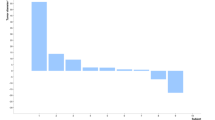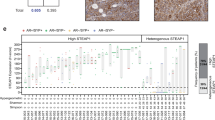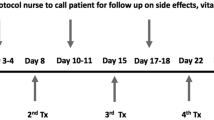Abstract
Preclinical studies demonstrate that intratumoral delivery of adenovirus expressing IL-2 eradicates pre-established tumors in mice and confers immune protection from rechallenge. To explore the activity of AdCAIL-2 in prostate cancer, a Phase I clinical trial was conducted in patients with localized disease and Gleason score >7 or prostate-specific antigen (PSA) >10 plus Gleason score 7. A total of 12 patients were injected 4 weeks prior to prostatectomy in a dose-escalation study at doses of 109, 5 × 109 and 1010 PFU of virus. No dose-limiting toxicity was observed. Side effects included perineal discomfort, hematuria, flu-like symptoms in two patients and urinary hesitancy in one patient. Pathology demonstrated an inflammatory response consisting predominantly of CD3+CD8+ T lymphocytes with areas of tumor necrosis. Intracellular cytokine staining of tumor-infiltrating lymphocytes demonstrated increases in both γ-interferon and IL-4 secreting T cells after vaccination. PSA levels fell in five of five evaluable patients treated at the lowest dose (mean decline of 33.3%, range 17–69%). At higher doses, PSA values initially increased after injection, then fell to baseline prior to surgery. This trial demonstrates the feasibility and safety of intraprostatic adenovector-mediated IL-2 gene delivery.
This is a preview of subscription content, access via your institution
Access options
Subscribe to this journal
Receive 12 print issues and online access
$259.00 per year
only $21.58 per issue
Buy this article
- Purchase on Springer Link
- Instant access to full article PDF
Prices may be subject to local taxes which are calculated during checkout





Similar content being viewed by others
References
Landis SH, Murray T, Bolden S, et al. Cancer statistics. 1999. CA Cancer J Clin. 1999;49:8–31.
Hanks GE, Krall JM, Hanlon AL, et al. Patterns of care and RTOG studies in prostate cancer: long-term survival, hazard rate observations, end possibilities of cure. Int J Radiat Oncol Biol Phys. 1994;28:39–45.
Walsh PC, Partin AW, Epstein JI . Cancer control and quality of life following anatomical radical retropubic prostatectomy: results at 10 years. J Urol. 1994;152(5 Part 2):1831–1836.
Jones GW, Mettlin C, Murphy GP, et al. Patterns of care for carcinoma of the prostate gland: results of a national survey of 1984 and 1990. J Am Coll Surg 1995;180:545–554.
Partin AW, Yoo J, Carter HB, et al. The use of prostate specific-antigen, clinical stage and Gleason score to predict pathological stage in men with localized prostate cancer. J Urol. 1993;149:1478–1481.
Partin AW, Kattan MW, Subong EN, et al. Combination of prostate-specific antigen, clinical stage, and Gleason score to predict pathological stage of localized prostate cancer, A multi-institutional update. JAMA. 1997;277:1445–1451.
Kattan MW, Eastham JA, Stapleton AM, et al. A preoperative nomogram for disease recurrence following radical prostatectomy for prostate cancer. J Natl Cancer Inst. 1998;90:766–771.
Blades RA, Keating PJ, McWilliam LJ, et al. Loss of HLA class I expression in prostate cancer. Implications for immunotherapy. Urology. 1995;46:681–686.
Rosenberg SA . Keynote address: perspectives on the use of interleukin-2 in cancer treatment. Cancer J Sci Am. 1997;3 (Suppl. 1):52–56.
Hautmann S, Huland E, Huland H . Intra-tumoral depot of interleukin-2 therapy inhibits tumor growth in Dunning adenocarcinoma of the prostate implanted subcutaneously in rats. J Cancer Res Clin Oncol. 1997;123:614–618.
Hautmann S, Huland E, Huland H . Local intratumor immunotherapy of prostate cancer with interleukin-2 reduces tumor growth. Anticancer Res. 1999;19:266–2664.
Vieweg J, Rosenthal FM, Bannerji R, et al. Immunotherapy of prostate cancer in the Dunning rat model: use of cytokine gene modified tumor vaccines. Cancer Res. 1994;54:1760–1765.
Stewart AK, Lassam NJ, Quirt IC, et al. Adenovector-mediated gene delivery of interleukin-2 in metastatic breast cancer and melanoma: results of a phase I clinical trial. Gene Therapy. 1999;6:350–363.
Stewart AK, Schimmer AD, Bailey DJ, et al. In vivo adenoviral-mediated gene transfer of interleukin-2 in cutaneous plasmacytoma. Blood. 1998;91:1095–1097.
Harrington KJ, Spitzweg A, Bateman AR, et al. Gene therapy for prostate cancer: current status and future prospects. J Urol. 2001;166:1220–1233.
Hwang LC, Fein S, Levitsky H, et al. Prostate cancer vaccines: current status. Semin Oncol. 1999;26:192–201.
Harris DT, Mayas GR, Gomella LG, et al. Immunologic approaches to the treatment of prostate cancer. Semin Oncol. 1999;26:439–447.
Hillman GG, Triest JA, Cher ML, et al. Prospects of immunotherapy for the treatment of prostate cancer—a review. Cancer Detect Prev. 1999;23:333–342.
Simons WJ, Mikkah B, Chang J-F, et al. Induction of immunity to prostate cancer antigens: results of a clinical trial of vaccination with irradiated autologous prostate tumor cells engineered to secrete granulocyte–macrophage colony-stimulating factor using ex vivo gene transfer. Cancer Res. 1999;59:5190–5168.
Bramson JL, Hitt M, Gauldie J, et al. Pre-existing immunity to adenovirus does not prevent tumor regression following intratumoral administration of a vector expressing IL-12 but inhibits virus dissemination. Gene Therapy. 1997;4:1069–1076.
O'Neal WK, Zhou H, Morral N, et al. Toxicity associated with repeated administration of first-generation adenovirus does not occur with helper-dependent vector. Mol Med. 2000;6:179–195.
Belldegrun N, Tso CL, Zisman A, et al. Interleukin-2 gene therapy for prostate cancer: phase I clinical trial and basic biology. Human Gene Ther. 2001;12:883–892.
Dawson NA . Response criteria in prostate carcinoma. Semin Oncol. 1999;26:174–184.
Dawson NA . Apples and oranges: building a consensus for standardized eligibility criteria and end points in prostate cancer clinical trials. J Clin Oncol. 1998;16:3398–3405.
Bowman L, Grossman M, Rill D, et al. IL-2 adenovector-transduced autologous tumor cells induce antitumor immune responses in patients with neuroblastoma. Blood. 1998;92:1941–1949.
Putzer BM, Hitt M, Muller WJ, et al. Interleukin 12 and B7-1 costimulatory molecule expressed by an adenovirus vector act synergistically to facilitate tumor regression. Proc Natl Acad Sci USA. 1997;94:10889–10894.
Acknowledgements
This work was supported by funding from the Canadian Institutes for Health Research, CANVAC network of centers of excellence, The Princess Margaret Hospital Foundation, The Moog Family, The ABC group and The Nelson Arthur Hyland Foundation. Dr Trudel is supported by a research fellowship of the National Cancer Institute of Canada. We would like to thank Greg Pond for his assistance with the statistical analysis.
Author information
Authors and Affiliations
Corresponding author
Rights and permissions
About this article
Cite this article
Trudel, S., Trachtenberg, J., Toi, A. et al. A phase I trial of adenovector-mediated delivery of interleukin-2 (AdIL-2) in high-risk localized prostate cancer. Cancer Gene Ther 10, 755–763 (2003). https://doi.org/10.1038/sj.cgt.7700626
Received:
Published:
Issue Date:
DOI: https://doi.org/10.1038/sj.cgt.7700626
Keywords
This article is cited by
-
Considering the potential for gene-based therapy in prostate cancer
Nature Reviews Urology (2021)
-
Intralesional Adenovirus-mediated Interleukin-2 Gene Transfer for Advanced Solid Cancers and Melanoma
Molecular Therapy (2008)
-
Gene therapy for malignant mesothelioma: beyond the infant years
Cancer Gene Therapy (2006)
-
Therapeutic effects of adoptive splenocyte transfer following in situ AdIL-12 gene therapy in a mouse prostate cancer model
Cancer Gene Therapy (2006)
-
Adenovirus as vehicle for anticancer genetic immunotherapy
Gene Therapy (2005)



